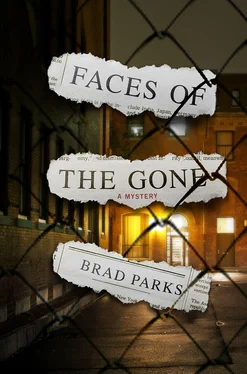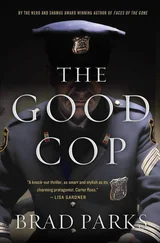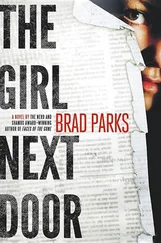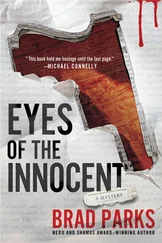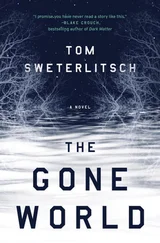Brad Parks - Faces of the Gone
Здесь есть возможность читать онлайн «Brad Parks - Faces of the Gone» весь текст электронной книги совершенно бесплатно (целиком полную версию без сокращений). В некоторых случаях можно слушать аудио, скачать через торрент в формате fb2 и присутствует краткое содержание. Год выпуска: 2010, ISBN: 2010, Издательство: Minotaur Books, Жанр: Триллер, на английском языке. Описание произведения, (предисловие) а так же отзывы посетителей доступны на портале библиотеки ЛибКат.
- Название:Faces of the Gone
- Автор:
- Издательство:Minotaur Books
- Жанр:
- Год:2010
- ISBN:9780312574772
- Рейтинг книги:3 / 5. Голосов: 1
-
Избранное:Добавить в избранное
- Отзывы:
-
Ваша оценка:
- 60
- 1
- 2
- 3
- 4
- 5
Faces of the Gone: краткое содержание, описание и аннотация
Предлагаем к чтению аннотацию, описание, краткое содержание или предисловие (зависит от того, что написал сам автор книги «Faces of the Gone»). Если вы не нашли необходимую информацию о книге — напишите в комментариях, мы постараемся отыскать её.
Faces of the Gone — читать онлайн бесплатно полную книгу (весь текст) целиком
Ниже представлен текст книги, разбитый по страницам. Система сохранения места последней прочитанной страницы, позволяет с удобством читать онлайн бесплатно книгу «Faces of the Gone», без необходимости каждый раз заново искать на чём Вы остановились. Поставьте закладку, и сможете в любой момент перейти на страницу, на которой закончили чтение.
Интервал:
Закладка:
Deadline had commandeered a disproportionately large part of the middle of the bed, leaving me wedged to one side. He grunted when I stirred, opened his eyes partway to shoot me a dirty look, then yawned dramatically. With his morning exercises thus dispatched, he settled back in for a well-earned nap.
By the time I got out of the shower it was after ten and Deadline was engaged in his other primary activity-pacing in front of his food bowl. So I gave him some breakfast, gave myself some breakfast, then grabbed my laptop and flopped on the couch.
I considered doing a little more reporting, maybe calling up the National Drug Bureau, feeding them what I knew and getting them to repeat it back to me-just to give the story a little more of an official grounding. Then I thought about having to deal with their press agent, L. Peter Sampson, Mr. I’m Not Authorized to Blow My Own Nose. And I decided to spare everyone the hassle.
No, it was time for me to write. People don’t always think of newspaper reporters as “writers,” inasmuch as our compositions are seldom confused with art. You know the statistical theorem that says a bunch of monkeys sitting at typewriters would eventually reproduce the complete works of Shakespeare-if you gave ’em a couple trillion years to do it? It would take the monkeys about forty-five minutes to come up with some of the slop that passes for raw copy around our shop.
Still, when you take into account that a newspaper reporter’s sole creation is the written word, we have to be considered writers. And, as writers go, we’re tough, resilient, dependable. We quietly scoff at the softer breeds. I mean, really, some magazine writers consider themselves “on deadline” when they’re three weeks away from having to deliver copy. Where I come from, that’s not a deadline. That’s two weeks off and a few leisurely days at the office.
Then there are those namby-pamby novelists who write what the critics deem to be “literature.” They’re the bichons frises of the writing world-they’re poofy, pretty, and everyone fawns over them. But the moment things get tough, they’re hiding under the kitchen table, making a mess on the floor.
Newspaper reporters? We’re the Australian cattle dogs of the writing world. Maybe we don’t look that great. We certainly don’t smell that great. But you can kick us in the head, trample us, stick us out in the rain or heat. Whatever. We’re still going to get the herd home, no excuses.
And so it was time for me to start herding. Or writing. Or whatever. I decided to start with something snappy. Something quick. Something smart.
“The Stuff wasn’t the right stuff for four Newark drug dealers,” I wrote, then immediately highlighted and erased it. Not only did it have a glaring cliche, it was about as smart as people who mistakenly drive in the EZ-Pass-only lane and then try to back up.
Okay. Maybe something a little straighter.
“The four people found murdered on Ludlow Street earlier this week sold the same brand of heroin, sources indicate,” I wrote, then erased that, too. If it was any straighter, it’d be a candidate for the papacy.
Okay. Let’s go back to snappy/quick/smart.
“It’s the heroin, stupid,” I typed, then immediately regretted the day I entered journalism.
I got up. It had been fifteen minutes, right? I peed, even though I didn’t need to. I scratched Deadline’s head. I noticed some cobwebs in the upper corner of my living room, grabbed some paper towels and cleaned them out.
Random bits of ideas started forming. Maybe I could start with something about the police being offtrack? No. It was possible they were just trying to throw us off with this bar-holdup angle, all the while knowing about The Stuff.
Perhaps I could start with something about Wanda, the beautiful girl whose dreams of being a dancer were cruelly snuffed out? No. It would take too long to get to the point.
The best thing I could do was follow the oldest and greatest newspaper advice ever given: write what you see. What had I really seen in this case?
Of course. Those dime bags. I sat back down and began typing a detailed description of them, and before I knew it, I was on my way. After a couple hours of typing-not to mention four Coke Zeros, two snacks, and thirteen mostly unnecessary trips to the bathroom-I was nearing something resembling a story when my cell phone rang. The caller ID was showing Szanto’s number.
“This is Carter Ross,” I said. “I’m sorry I can’t answer the phone right now-”
“Shhvvttt,” Szanto growled. “You got anything I can read yet?”
I glanced at the clock on my computer screen. “I’m close. But it’s only two-thirty, what’s the hurry?”
“The hurry is Brodie wants this to lead tomorrow’s paper and I don’t want to walk into the three-o’clock meeting without having seen it. So why don’t you just stop pretending like you’re the second coming of Bernard Malamud and send it in?”
That was one of Szanto’s favorite sayings.
“Okay, I’ll e-mail it to you in a second,” I said.
“How long is it?”
We measured length of stories in column inches-how long it would be if laid out in standard type and column width.
“About thirty-five,” I said, which is about twice the normal length.
“Maybe you haven’t heard this yet,” Szanto said. “But times are a wee bit tight in the newspaper industry. We’ve had a few little cutbacks in space that makes it difficult to run longer stories. Any of this ring a bell?”
“I know, Sal, I know,” I said. And I did. On some days, the number of column inches we devoted to news coverage was half what it used to be. I added: “Don’t worry, it’s worth it.”
“Jzzss Krrsst,” he grumbled, then hung up.
I gave the story one more quick read-it was decent, though Bernard Malamud had nothing to worry about-then sent it in.
“Well, Deadline,” I said to my cat. “What now?”
Deadline, who had slipped into one of his twenty-eight daily comas, had no answer.
Against my better judgment, I decided to go into the office. It was time to see if I could find someone who might tell me a little more about my heroin samples, preferably someone with a white lab coat. I knew that with the right assortment of gadgets, the right chemist could tell me how pure my heroin was and where in the world it originated.
Sadly, such people do not advertise their services. My knowledgeable-though-often-misguided research assistant, Mr. Google, pointed me toward friendly people who wanted to help me beat my company’s drug-testing program. I found one laboratory that claimed it specialized in identifying unknown substances and testing the composition of known ones. But when I called them and told a nice scientist the substance she’d be testing was heroin, she suddenly was in a hurry to get off the phone.
I called another lab where a chemist suggested I not tell him it was heroin, that way he could accept it without knowingly breaking any laws. He also said I could expect a three-to-six-week turnaround. For an additional fee, he told me they’d “put a rush on it” and get it to me in two weeks. I must not have mentioned I worked for a daily newspaper.
After a few more unsuccessful phone calls, I resigned myself to asking for help. Worse, I realized where that help was going to have to come from: Buster Hays.
Hays is a cantankerous son of a bitch, but he’s also a cantankerous son of a bitch who has sources and connections all over law enforcement. Somehow, don’t ask me how, he had managed to build up enough goodwill that everyone seemed to owe him favors. And ultimately he was enough of a team player-in his own grouchy, condescending way-that he’d didn’t mind cashing in a favor to help you.
Читать дальшеИнтервал:
Закладка:
Похожие книги на «Faces of the Gone»
Представляем Вашему вниманию похожие книги на «Faces of the Gone» списком для выбора. Мы отобрали схожую по названию и смыслу литературу в надежде предоставить читателям больше вариантов отыскать новые, интересные, ещё непрочитанные произведения.
Обсуждение, отзывы о книге «Faces of the Gone» и просто собственные мнения читателей. Оставьте ваши комментарии, напишите, что Вы думаете о произведении, его смысле или главных героях. Укажите что конкретно понравилось, а что нет, и почему Вы так считаете.
